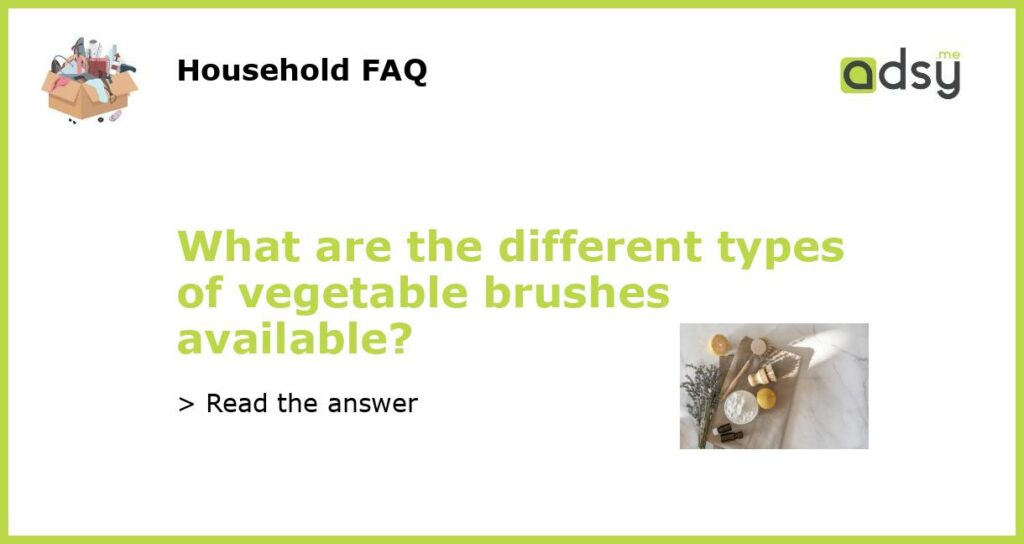The Different Types of Vegetable Brushes Available
When it comes to cleaning vegetables, having the right tools at hand is essential. One of these tools is a vegetable brush. A vegetable brush is designed to remove dirt, debris, and any other unwanted substances from the surface of vegetables, ensuring that they are clean and safe to eat. In this article, we will explore the different types of vegetable brushes available on the market.
Nylon Bristle Vegetable Brush
One of the most common types of vegetable brushes is the nylon bristle brush. These brushes typically have sturdy nylon bristles that are strong enough to remove dirt and debris without damaging the surface of the vegetables. The bristles are usually stiff and densely packed to provide optimal cleaning performance.
Nylon bristle brushes are versatile and can be used on a wide variety of vegetables, including root vegetables like potatoes and carrots, as well as leafy greens like lettuce and spinach. They are also great for scrubbing tough-skinned vegetables like squash and cucumbers.
If you are looking for a reliable and durable vegetable brush, nylon bristle brushes are a great option. They are easy to clean and maintain, and many come with a comfortable grip handle for easy use.
Natural Bristle Vegetable Brush
For those who prefer a more eco-friendly option, natural bristle vegetable brushes are a great choice. These brushes are usually made from plant-based materials such as coconut fibers or horsehair. The natural bristles are softer than nylon bristles, making them ideal for cleaning delicate vegetables without causing any damage.
Natural bristle brushes are particularly well-suited for cleaning vegetables with soft skins, such as tomatoes and peaches. They are also great for gently scrubbing mushrooms and other fungi, as well as removing any stubborn dirt from the surface of leafy greens.
One of the advantages of natural bristle brushes is that they are biodegradable and compostable, making them an environmentally friendly option. However, they may require more regular cleaning and maintenance compared to nylon bristle brushes to prevent the growth of bacteria or mold.
Silicone Vegetable Brush
Silicone vegetable brushes have become increasingly popular in recent years. These brushes are made from food-grade silicone, which is heat-resistant and non-porous, making them hygienic and easy to clean. Silicone brushes are also durable and do not retain odors or flavors from the vegetables.
One of the main advantages of silicone brushes is that they are flexible and have soft bristles. This makes them gentle on the surface of vegetables while still providing effective cleaning. Silicone brushes can be used on a wide range of vegetables, including delicate greens, fruits, and even fragile mushrooms.
Moreover, silicone brushes are dishwasher safe and can withstand high temperatures, making them a convenient choice for those who prefer to sanitize their brushes in the dishwasher.
Vegetable Brush with Handle
Another option to consider is a vegetable brush that comes with a handle. These brushes typically have a brush head with bristles on one side and a comfortable grip handle on the other side. The handle provides better control and leverage when cleaning vegetables, making the process easier and more efficient.
Vegetable brushes with handles come in a variety of materials, such as plastic, wood, or metal. Plastic handles are often lightweight and easy to clean, while wooden handles provide a more natural and earthy feel. Metal handles are usually more durable and long-lasting.
When choosing a vegetable brush with a handle, consider the material, grip, and weight of the handle to ensure that it suits your preferences and needs.
Multi-Purpose Vegetable Brush
If you are looking for a versatile option that can handle more than just vegetables, a multi-purpose vegetable brush might be the answer. These brushes often have different types of bristles and surfaces, allowing you to clean different types of food items.
For example, some multi-purpose brushes come with a softer bristle surface for cleaning vegetables and a rougher surface for scrubbing potatoes or other root vegetables. Others may have a built-in scraper for removing the tough skin of fruits or seeds from peppers.
A multi-purpose vegetable brush can be a convenient and space-saving option. However, it is important to ensure that the brush is suitable for the specific types of foods you plan to clean to avoid any potential cross-contamination.






